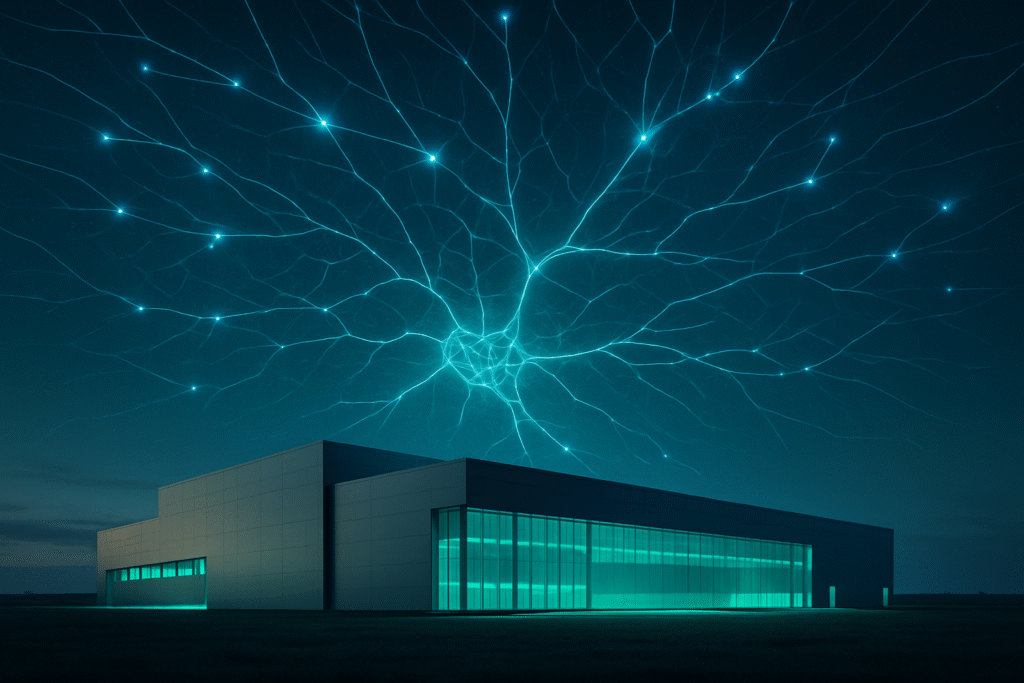
Google (NASDAQ: GOOGL) has announced a monumental $4 billion investment in cloud and artificial intelligence (AI) infrastructure in Arkansas through 2027, marking a significant stride in the tech giant's commitment to advancing U.S. AI capabilities. This substantial financial injection will primarily fund the construction of Google's first data center in the state, located in West Memphis, and underscores a strategic push to expand the company's regional cloud presence and enhance its AI processing power. The announcement, made on October 2, 2025, with further elaborations by Google and Alphabet CEO Sundar Pichai on October 6, 2025, highlights Arkansas's emerging role in the national AI landscape.
This multi-faceted investment is poised to have immediate and far-reaching implications for AI innovation across the United States. By establishing a new, massive data center and integrating sustainable energy solutions, Google is not only scaling its operational capacity but also setting a precedent for responsible AI development. The initiative is expected to generate thousands of jobs, foster a skilled workforce through free AI training programs, and solidify the U.S.'s competitive edge in the global AI race, demonstrating Google's dedication to both technological advancement and regional economic growth.
The Technical Core of Google's Arkansas Expansion
Google's $4 billion investment is anchored by the development of its first Arkansas data center, an expansive facility spanning over 1,000 acres in West Memphis. This new infrastructure is meticulously designed to serve as a critical hub for cloud and AI operations, providing the colossal computing power necessary to train sophisticated large language models and process the ever-growing datasets that fuel advanced AI applications. The scale of this data center signifies a substantial increase in Google's capacity to handle the surging demand for AI computing, offering enhanced reliability and speed for businesses relying on AI-powered cloud services, particularly in the Southern U.S.
Beyond the physical data center, Google is integrating cutting-edge energy initiatives to power its operations sustainably. A $25 million Energy Impact Fund will support energy efficiency and affordability for local residents, while a collaboration with Entergy will bring a new 600 MW solar project to the grid, complemented by a 350 MW battery storage system. This commitment to renewable energy and grid stability differentiates Google's approach, demonstrating an effort to mitigate the significant energy demands typically associated with large-scale AI infrastructure. This sustainable design is a crucial evolution from previous data center models, which often faced criticism for their environmental footprint, positioning Google as a leader in eco-conscious AI development.
Initial reactions from the AI research community and industry experts have been overwhelmingly positive. Many see this investment as a vital step in strengthening the foundational infrastructure required for the next generation of AI breakthroughs. The emphasis on both raw processing power and sustainable energy has been particularly lauded, indicating a maturing understanding within the industry of the broader societal and environmental responsibilities that come with scaling AI technologies. Experts predict that this robust infrastructure will accelerate research and development in areas like generative AI, advanced machine learning, and autonomous systems.
Competitive Implications and Market Positioning
This significant investment by Google (NASDAQ: GOOGL) in Arkansas carries profound implications for the competitive landscape of the AI sector, impacting tech giants, emerging AI labs, and startups alike. Google's expansion of its cloud and AI infrastructure directly strengthens its competitive position against rivals such as Amazon (NASDAQ: AMZN) with Amazon Web Services (AWS) and Microsoft (NASDAQ: MSFT) with Azure, both of whom are also heavily investing in AI-driven cloud solutions. By increasing its data center footprint and processing capabilities, Google can offer more robust, faster, and potentially more cost-effective AI services, attracting a broader array of enterprise clients and developers.
Companies heavily reliant on Google Cloud for their AI workloads stand to benefit immensely from this development. Startups and mid-sized businesses leveraging Google's AI Platform or various AI/ML APIs will experience enhanced performance, reduced latency, and greater scalability, which are critical for deploying and iterating on AI-powered products and services. This investment could also encourage new startups to build on Google Cloud, given the enhanced infrastructure and the company's commitment to fostering a skilled workforce through its training programs.
The strategic advantage for Google lies in its ability to further integrate its AI research directly into its cloud offerings. This tight coupling allows for faster deployment of new AI models and features, potentially disrupting existing products or services offered by competitors who may not have the same level of integrated hardware and software development. Furthermore, the focus on sustainable energy solutions could become a key differentiator, appealing to environmentally conscious businesses and governmental organizations. This move solidifies Google's market positioning as not just a leader in AI research, but also as a provider of the foundational infrastructure essential for the widespread adoption and development of AI.
Broader Significance in the AI Landscape
Google's $4 billion investment in Arkansas is a pivotal development that seamlessly integrates into the broader AI landscape and reflects several overarching trends. Firstly, it underscores the escalating demand for computational power driven by the rapid advancements in AI, particularly in large language models and complex machine learning algorithms. This investment signifies that the "AI race" is not just about algorithmic innovation, but also about the physical infrastructure required to support it. It aligns with a global trend of major tech players establishing regional data centers to bring AI closer to users and developers, thereby reducing latency and improving service delivery.
The impacts of this investment extend beyond mere technological expansion. Economically, it promises to revitalize the local Arkansas economy, creating thousands of construction jobs and hundreds of high-skilled operational roles. The provision of free AI courses and certifications, in partnership with the Arkansas Department of Commerce, is a critical initiative aimed at upskilling the local workforce, creating a talent pipeline that will support not only Google's operations but also foster a broader tech ecosystem in the region. This human capital development is crucial for ensuring equitable access to the opportunities presented by the AI revolution.
While the benefits are substantial, potential concerns could include the environmental impact of such a large-scale data center, even with Google's commitment to renewable energy. The sheer volume of resources required for construction and ongoing operation necessitates careful monitoring. Comparisons to previous AI milestones, such as the initial breakthroughs in deep learning or the widespread adoption of cloud computing, highlight that infrastructure investments of this magnitude are often precursors to significant leaps in technological capability and accessibility. This move by Google is reminiscent of the foundational investments made during the early days of the internet, laying the groundwork for future innovation.
Future Developments and Expert Predictions
Looking ahead, Google's substantial investment in Arkansas is expected to catalyze a wave of near-term and long-term developments in the U.S. AI landscape. In the near term, we can anticipate a rapid acceleration in the construction phase of the West Memphis data center, leading to the creation of thousands of construction jobs and a significant boost to local economies. Once operational, the data center will provide a powerful new hub for Google Cloud services, attracting businesses and developers seeking high-performance AI and cloud computing resources, particularly in the Southern U.S.
In the long term, this infrastructure is poised to unlock a plethora of potential applications and use cases. Enhanced processing power and reduced latency will facilitate the development and deployment of more sophisticated AI models, including advanced generative AI, real-time analytics, and highly complex simulations across various industries. We can expect to see advancements in areas such as precision agriculture, logistics optimization, and personalized healthcare, all powered by the increased AI capabilities. The workforce development initiatives, offering free AI courses and certifications, will also contribute to a more AI-literate population, potentially fostering a new generation of AI innovators and entrepreneurs in Arkansas and beyond.
However, challenges remain. The continuous demand for energy to power such large-scale AI infrastructure will necessitate ongoing innovation in renewable energy and energy efficiency. Cybersecurity will also be paramount, as these data centers become critical national assets. Experts predict that this investment will solidify Google's position as a dominant player in the AI infrastructure space, potentially leading to further regional investments by other tech giants as they seek to compete. The expectation is that this will foster a more distributed and resilient AI infrastructure across the U.S., ultimately accelerating the pace of AI innovation and its integration into daily life.
A New Era for U.S. AI Infrastructure
Google's (NASDAQ: GOOGL) $4 billion investment in Arkansas represents a pivotal moment in the ongoing evolution of artificial intelligence and cloud computing infrastructure in the United States. The construction of a new, state-of-the-art data center in West Memphis, coupled with significant commitments to sustainable energy and workforce development, underscores a strategic vision that extends beyond mere technological expansion. Key takeaways include the substantial boost to U.S. AI processing capabilities, the creation of thousands of jobs, and the establishment of a new regional hub for AI innovation, particularly in the Southern U.S.
This development holds immense significance in AI history, marking a new chapter where the physical infrastructure supporting AI becomes as critical as the algorithmic breakthroughs themselves. It signifies a move towards a more robust, distributed, and sustainable AI ecosystem, addressing the growing demands for computational power while also acknowledging environmental responsibilities. The investment in human capital through free AI training programs is equally important, ensuring that the benefits of this technological advancement are accessible to a broader segment of the population.
In the coming weeks and months, industry observers will be closely watching the progress of the data center's construction and the impact of Google's workforce development initiatives. We can expect further announcements regarding partnerships, new AI services leveraging this enhanced infrastructure, and potentially, similar investments from competing tech giants. This monumental undertaking by Google is not just an investment in technology; it is an investment in the future of U.S. AI leadership and a testament to the transformative power of artificial intelligence.
This content is intended for informational purposes only and represents analysis of current AI developments.
TokenRing AI delivers enterprise-grade solutions for multi-agent AI workflow orchestration, AI-powered development tools, and seamless remote collaboration platforms.
For more information, visit https://www.tokenring.ai/.





